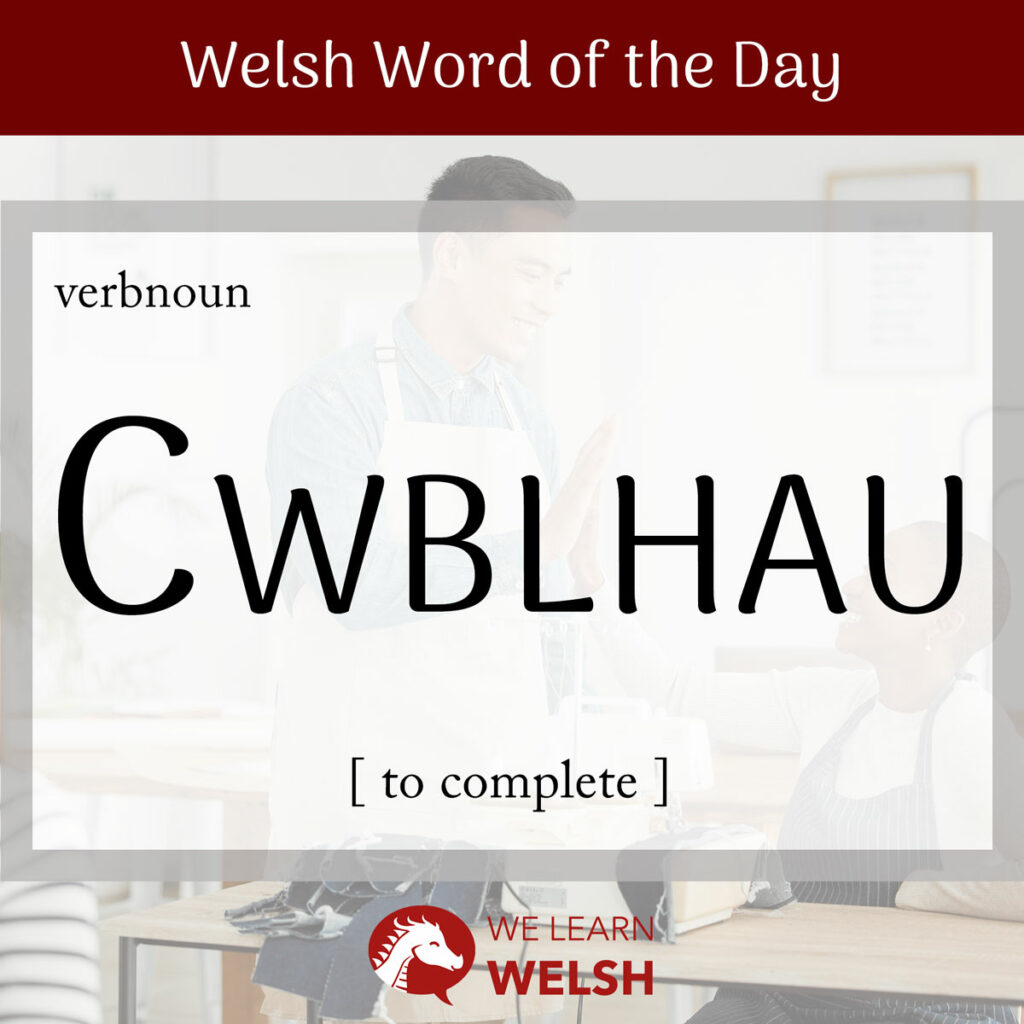In Welsh, the verb meaning to complete something is cwblhau.
cwblhau
to complete
It comes from the word cwbl, meaning complete or everything, paired with the suffix –hau, which is used to shift adjectives in Welsh into verb-nouns. For example, iach (healthy) becomes iachau (to heal, to make healthy), and cryf (strong) becomes cryfhau (to strengthen).
Cwbl itself can be used as an adjective or a noun, and it’s a cognate with Cornish coul / cowal, although its etymology is unknown.
There are plenty of synonyms for cwblhau, with gorffen translating roughly to to finish, cyflawni meaning to fulfil or to accomplish, and other options including diweddu and terfynu. However, cwblhau is the most direct translation of to complete. For example, you would cwblhau ffurflen (complete a form), whereas gorffen ffurflen would sound wrong – it would sound like you were saying finish a form.

Cwplau is a slightly less common alternative form of the word, and in the South of Wales you might hear cwpla.
Soft mutation
gwblhau
Nasal mutation
nghwblhau
Aspirate mutation
chwblhau
As you’ll know by now if you’ve spent much time learning Welsh, the cases in which you’ll need to actually use these mutations are varied and can be quite confusing! Here’s a couple to start you off.
Firstly, a soft mutation occurs following an indirect object. The phrase rhaid i mi means I have to, but in Welsh, because the word rhaid (have to) comes first, and mi ( I ) is functioning as an indirect object. So, I have to complete the report would be rhaid i mi gwblhau’r adroddiad.
Secondly, an aspirate mutation occurs after some pre-verbal particles, such as the negation ni. So, if you’re saying someone didn’t complete something, your sentence would begin ni chwblheuodd. In spoken Welsh the ni particle is often omitted, but its mutating effect remains.
Chwblheuodd hi ddim y gwaith cartref.
She didn’t finish the homework.
Cwblheuodd or chwblheuodd in this context is the third-person past tense of cwblhau. Here are some more of cwblhau’s most useful conjugations.
| Future | Conditional | Past | |
| First person singular | Cwblheuaf i I will complete | Cwblheuwn i I would complete | Cwblheues i I completed |
| First person plural | Cwblheuwn ni We will complete | Cwblheuen ni We would complete | Cwblheuon ni We completed |
| Second person singular / informal | Cwblheui di You will complete | Cwblheuet ti You would complete | Cwblheuest ti You completed |
| Second person plural / formal | Cwblheuwch chi You will complete | Cwblheuech chi You would complete | Cwblheuoch chi You completed |
| Third person singular | Cwblheuith o/e/hi He/she will complete | Cwblheuai fo/fe/hi He/she would complete | Cwblheuodd o/e/hi He/she completed |
| Third person plural | Cwblheuan nhw They will complete | Cwblheuen nhw They would complete | Cwblheuon nhw They completed |
Mae’r cysylltiad wedi’i gwblhau.
The connection is complete.
Some of the most common terms you might come across using cwblhau and cwbl include:
- wedi cwblhau / cwblhei = completed
- wedi’r cwbl = after all
- dyddiad cwblhau = deadline
- cwblhad / cwblhawyd = completion
- i fod i gael ei gwblhau = due to be completed
- dim o gwbl = not at all
- yn gyfan gwbl = completely
- cychwyn a chwblhau = to start and finish
And of course, we’ve all fallen victim to the woes of cwblhau geiriau awtomatig (automatic word completion) when using technology. This is particularly a problem when you’re trying to type in Welsh and you’re using an English computer! When I type cwblhau into a Word document, Autocorrect wants me to change it to cable (cebl)…
It’s about time for me to cwblhau this article. What’s the worst Autocorrect suggestion you’ve ever had for a Welsh word?

